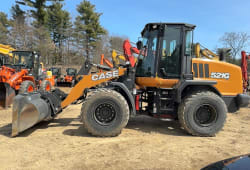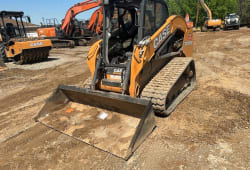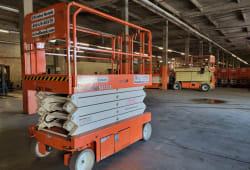Buying Used Lowboy Trailers: A Smart Choice for Heavy Machinery Transportation
5 Min read
)
March 7, 2024
Introduction
Lowboy trailers play a crucial role in the transportation of heavy machinery. These specialized trailers are designed to accommodate oversized and overweight loads, making them an indispensable asset for industries dealing with construction, mining, and agriculture. In this article, we will explore the world of lowboy trailers, focusing on their types, advantages, buying considerations for used ones, maintenance tips, top brands, and where to find quality used lowboy trailers.
Types of Lowboy Trailers
Fixed Gooseneck Lowboy Trailers
Fixed gooseneck lowboy trailers feature a fixed front end that connects to the truck's hitch. They are known for their simplicity and affordability.
Mechanical Detachable Gooseneck Lowboy Trailers
These trailers allow for easy detachment of the gooseneck from the trailer, providing a lower deck height for loading and unloading heavy machinery.Hydraulic Detachable Gooseneck Lowboy Trailers
Hydraulic detachable gooseneck trailers offer the convenience of hydraulically lifting the front end, simplifying the detachment process and enhancing maneuverability.
Folding Gooseneck Lowboy Trailers
Folding gooseneck lowboy trailers feature a front section that can be folded down, creating a ramp for loading and unloading equipment without the need for additional ramps.
Advantages of Lowboy Trailers
Lowboy trailers offer several advantages that make them the preferred choice for transporting heavy machinery:
Low Ground Clearance
With their low deck height, lowboy trailers provide ample clearance, allowing for the transportation of tall and oversized equipment without the risk of clearance issues.
Versatility in Heavy Machinery Transportation
From bulldozers to excavators, lowboy trailers can accommodate a wide range of heavy machinery, making them versatile assets for various industries.
Safety Features
Many lowboy trailers come equipped with safety features such as ramps, tie-down points, and load-securing devices to ensure the safe transportation of heavy loads.
Easy Loading and Unloading
The design of lowboy trailers, particularly those with detachable goosenecks or folding ramps, simplifies the loading and unloading process, saving time and labor costs.
Factors to Consider When Buying a Used Lowboy Trailer
When purchasing a used lowboy trailer, it's essential to consider the following factors to ensure you're getting a reliable and safe piece of equipment:
Structural Integrity
Inspect the frame, cross members, and welds for signs of damage or wear that could compromise the trailer's structural integrity.
Maintenance Records
Request maintenance records to verify that the trailer has been properly maintained and serviced according to manufacturer recommendations.
Tire Condition
Check the condition of the tires, including tread wear and sidewall damage, and ensure they are appropriate for the intended use.
Brake System
Inspect the brake system, including brake pads, drums, and hydraulic components, to ensure they are in good working condition.
Legal Compliance
Verify that the trailer meets all legal requirements, including weight restrictions, lighting, and brake regulations, to avoid potential fines or penalties.
Tips for Maintaining a Used Lowboy Trailer
To ensure the longevity and safety of your used lowboy trailer, follow these maintenance tips:
Regular Inspection
Perform routine inspections of the trailer, including the frame, suspension, brakes, and tires, to identify any issues early and prevent costly repairs.
Proper Lubrication
Keep moving parts well-lubricated to reduce friction and wear, extending the lifespan of components such as axles, hinges, and ramps.
Cleaning and Rust Prevention
Clean the trailer regularly to remove dirt, debris, and corrosive substances that can cause rust and corrosion, particularly in high-moisture environments.
Tire Maintenance
Monitor tire pressure and tread wear regularly, and replace worn or damaged tires promptly to prevent blowouts and accidents on the road.
Brake System Maintenance
Check the brake system regularly for signs of wear or malfunction, and have it serviced by a qualified technician as needed to ensure optimal performance.
Top Brands for Used Lowboy Trailers
Several reputable brands offer high-quality used lowboy trailers, including:
Trail King
Fontaine
Talbert
XL Specialized Trailers
Eager Beaver
Where to Find Quality Used Lowboy Trailers
When shopping for a used lowboy trailer, consider the following sources:
Online Marketplaces: Websites like Boom and Bucket often have listings for used lowboy trailers from private sellers and dealerships.
Dealerships Specializing in Heavy Machinery: Many dealerships that specialize in selling heavy machinery also offer a selection of used lowboy trailers for sale.
Conclusion
Lowboy trailers are indispensable assets for industries that rely on the transportation of heavy machinery. Opting for a used lowboy trailer can be a cost-effective solution without compromising on quality or safety. By considering factors such as structural integrity, maintenance records, and proper upkeep, businesses can ensure they invest in a reliable and durable piece of equipment that will serve their transportation needs for years to come.
FAQs
What is the maximum weight capacity of a typical lowboy trailer?
The maximum weight capacity of a lowboy trailer varies depending on its design and configuration. However, most lowboy trailers can accommodate loads ranging from 40,000 to 80,000 pounds.
How often should I inspect a used lowboy trailer?
It's recommended to inspect a used lowboy trailer before each use and perform a more thorough inspection at least once a month to identify any potential issues or safety concerns.
Are there specific regulations regarding the transportation of heavy machinery using lowboy trailers?
Yes, there are regulations governing the transportation of heavy machinery, including weight limits, permit requirements, and safety standards. It's essential to familiarize yourself with these regulations to ensure compliance and avoid fines or penalties.
Can I customize a used lowboy trailer to fit my specific needs?
Yes, many dealerships and manufacturers offer customization options for lowboy trailers, allowing you to tailor the trailer to your specific requirements, such as additional tie-down points, ramps, or storage compartments.
How can I ensure the used lowboy trailer I'm purchasing is in good condition?
Before purchasing a used lowboy trailer, thoroughly inspect the trailer for signs of wear, damage, or rust. Request maintenance records and consider hiring a qualified mechanic to inspect the trailer for any hidden issues.

Caleb Woods is an experienced content specialist and an editor at Boom & Bucket, blending his journalism background with expertise in the heavy equipment industry. He delivers engaging, informative content to help professionals stay informed and make smarter decisions in the machinery market.











